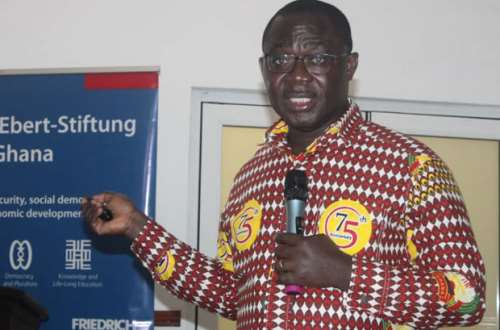The Director of the Labour and Research Institute of the Trade Union Congress (TUC), Dr. Kwabena Nyarko Otoo, has bemoaned the decline in real wages for workers on the single spine salary structure.
According to him, the decline which had begun in 2012 is especially being felt direly now as the country treads through an economic rough patch.
Currently, the average salary of a worker on the single spine is ₵1,800, he revealed.
With no sign of government looking to increase salaries of public sector workers and the country’s severe economic situation, he stated that the situation has a double impact on workers trying to make a living.
“Let me indicate to you that even before this current economic challenge, we’ve always had problems with the pay situation in Ghana. In actual fact, if you take workers on the single spine, our real wages on the single spine have declined since 2012,” he said on JoyNews' PM Express.
He noted that the decline in wages was further contributing to the stark disparities in income received by workers from the single spine structures and those who form a part of Article 71 office holders and workers of state enterprises.
“We’ve also had a problem of rising wage in equities in the public sector. So you compare single spine with say Article 71, you compare with salaries in the state enterprises, you find that the large number of people on the single spine are actually not given a fair deal in terms of remuneration in Ghana.
“So all of these are issues we need to deal with in addition to the issues that have come up in this economic crisis that we find ourselves in.” he noted.
Dr. Nyarko Otoo stated that in order to get results, the Congress has taken to dealing with issues holistically in a sense that the issues of all member unions are taken before government at once for dialogue and engagement towards better conditions of service.
“Unions will go on strike, unions will demonstrate, there will be an action, but the fact of the matter is this, if you address the issue for one union, the other unions will come up. So it’s always better that you deal with the issues more holistically rather than in isolation,” he said.
Latest Stories
-
Insinuating Bagbin is not heeding calls for recall because he is NDC unfounded and unfortunate – Parliament
1 hour -
Ashanti, Nelly are engaged and expecting a baby
2 hours -
New Ghana train on test run involved in accident
2 hours -
World Bank, AfDB partner to provide 300m African’s with electricity access
2 hours -
Ghana wins preliminary ruling in Cassius Mining’s $300m international arbitration
3 hours -
Ghana’s revenue-to-GDP ratio to exceed 17% within next six years, but expenditure to remain flat – IMF
3 hours -
Gborbu Wulomo didn’t marry Naa Okromo – Chieftaincy Minister
3 hours -
Oquaye Jr. says he’s undeterred by ‘propaganda’ twist to viral laundry video
3 hours -
Ghana’s debt-to-GDP ratio to tumble to 69.7% in 2029 – IMF
3 hours -
Interior Ministry imposes 4pm to 7am curfew on Sampa
3 hours -
Child marriage: Teenage girl to be released to her family – Gender Minister-designate
3 hours -
Naa Okromo is 15 years old, still a virgin and not married to Gborbu Wulomo – Government
4 hours -
GhIE condemns intervention by Ashanti Regional Minister in ECG Affairs; commends ECG GM for upholding regulatory standards
4 hours -
GPL: Asantehene tasks Asante Kotoko to do ‘better’ after crucial meeting
4 hours -
Why Sam Jonah can’t trust Ghanaian journos to cover Election 2024 professionally
4 hours

